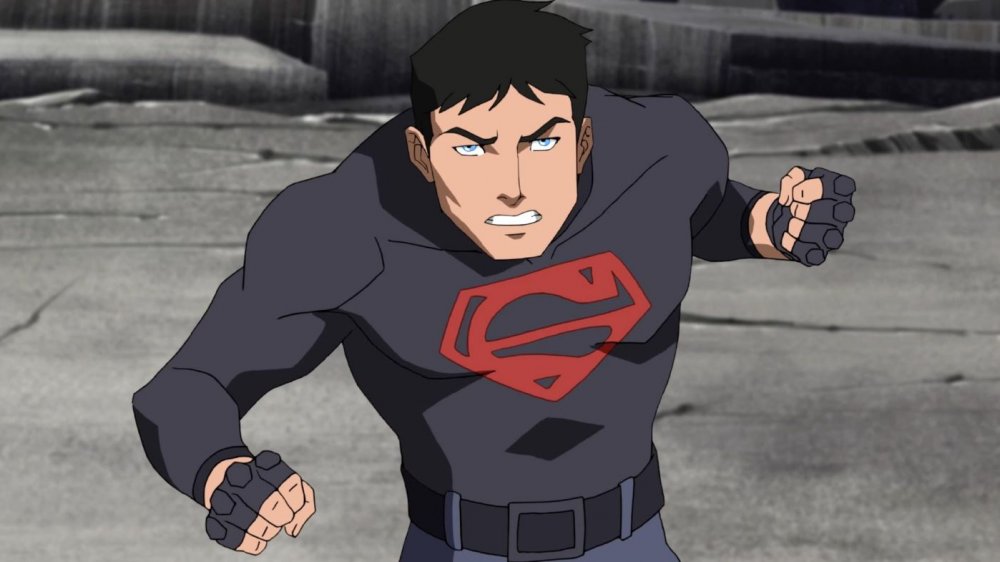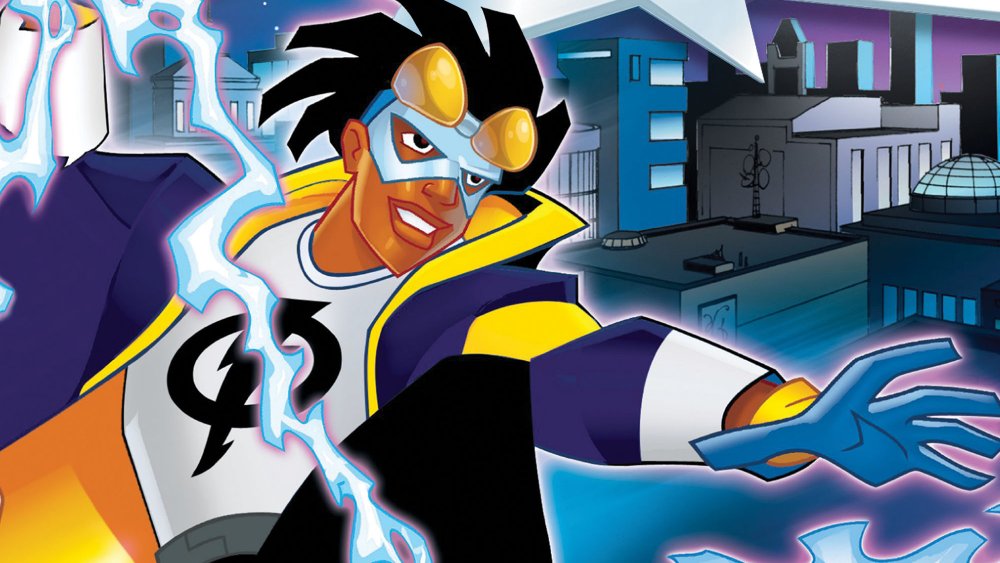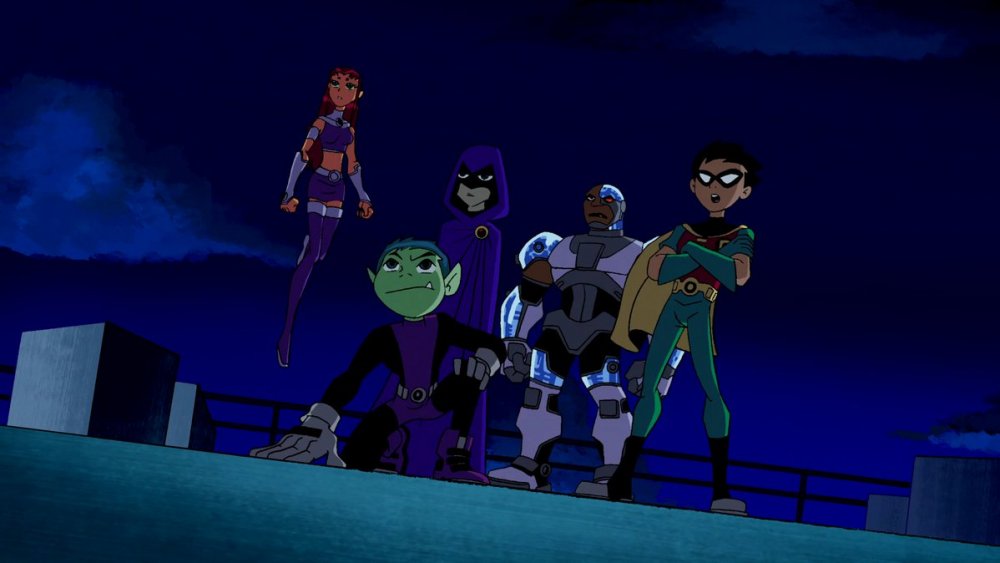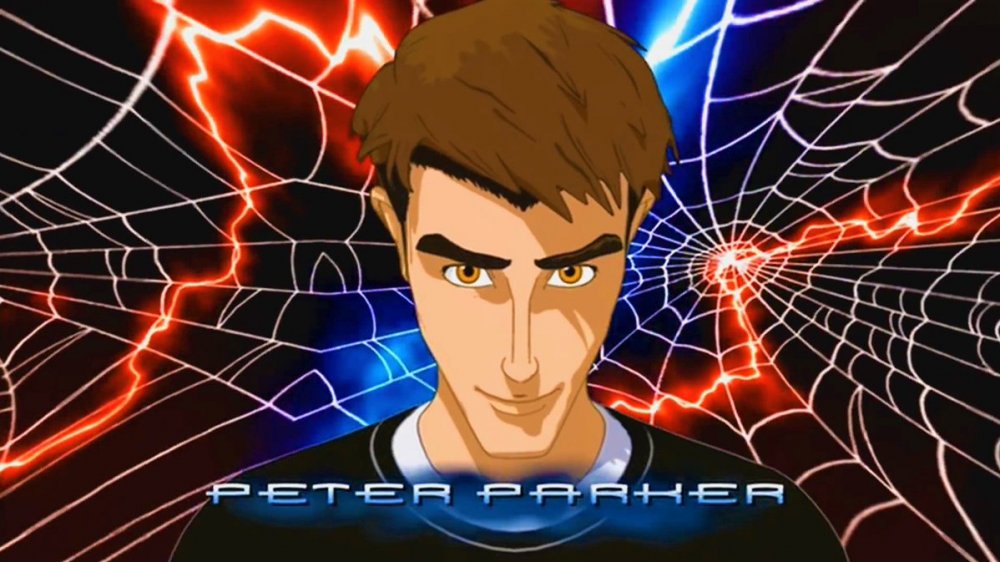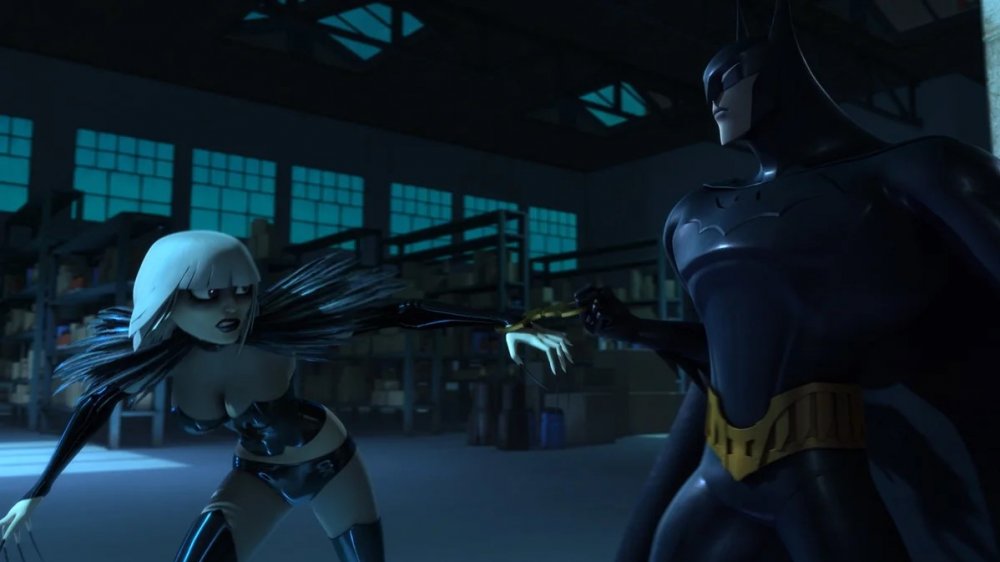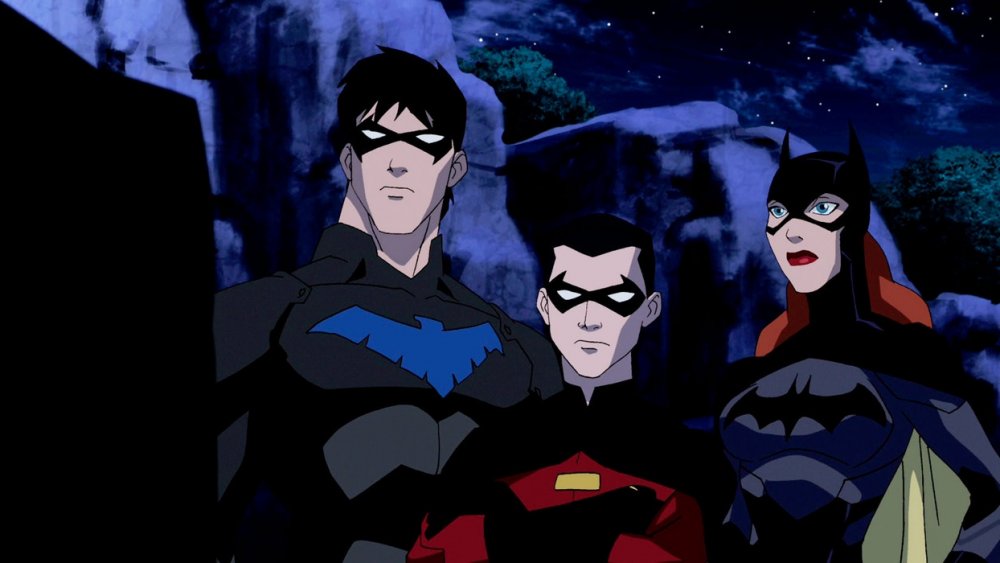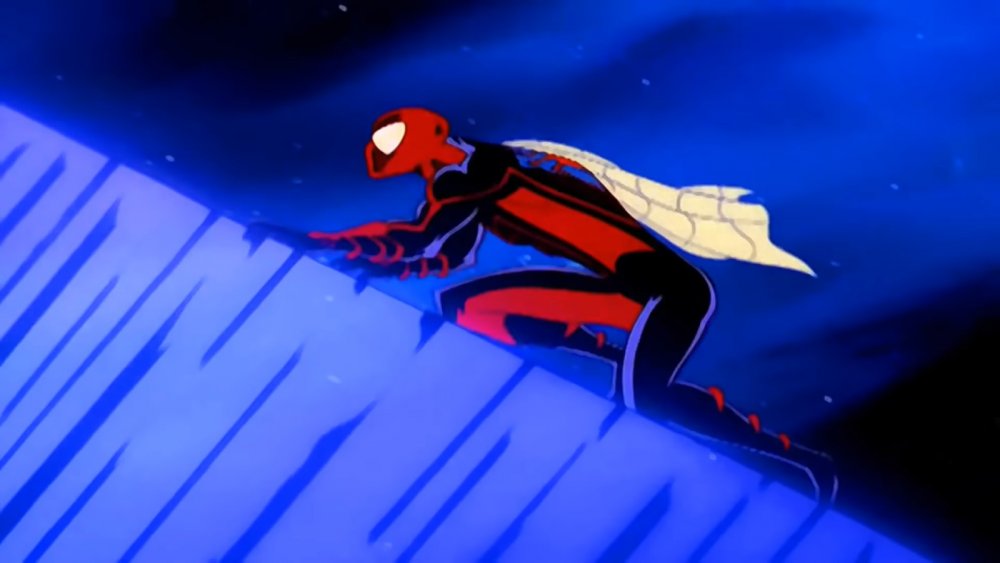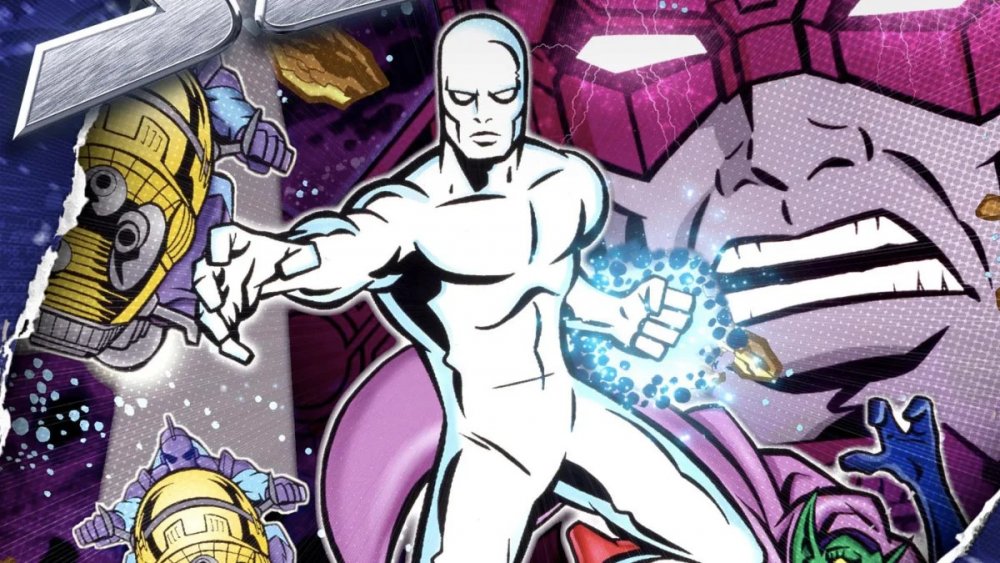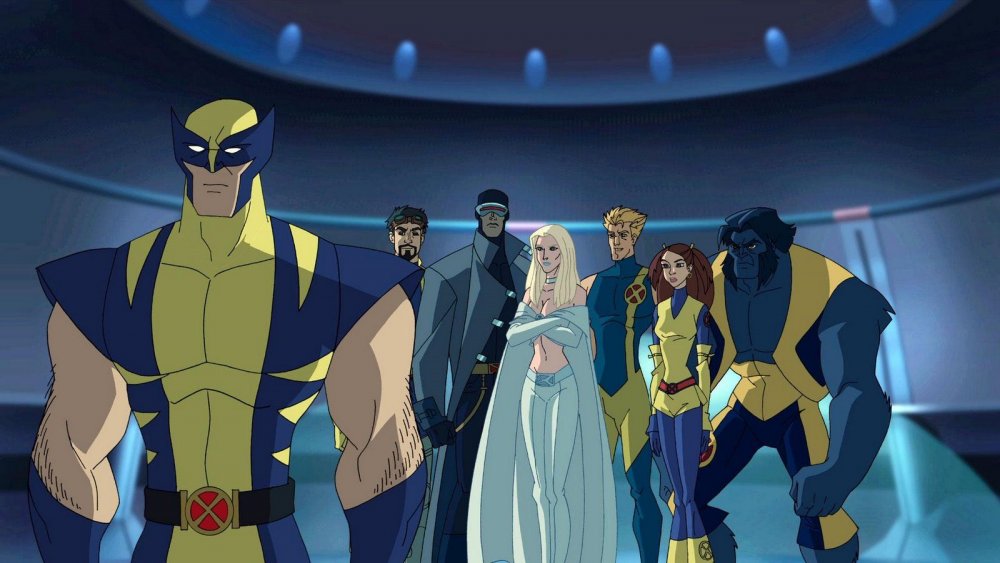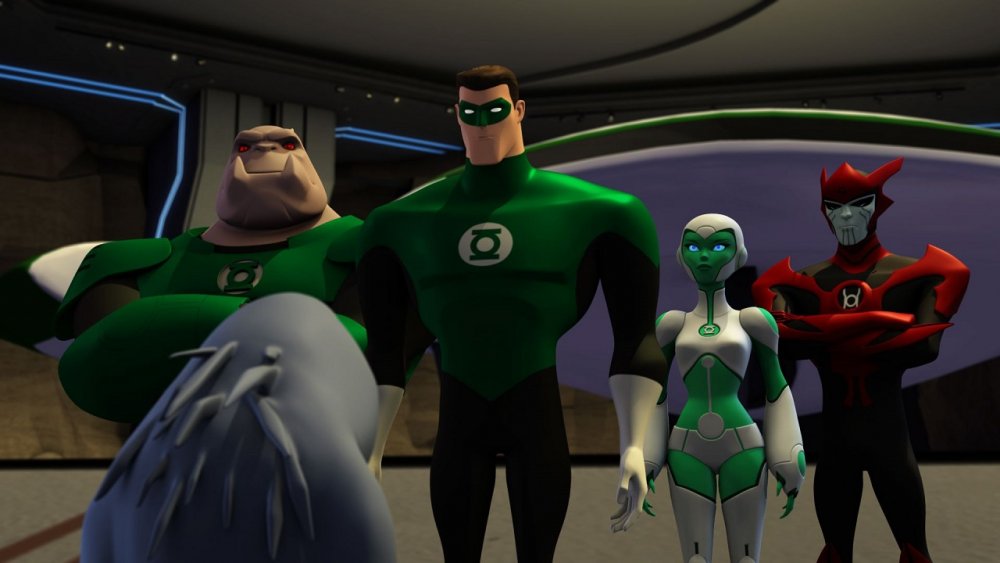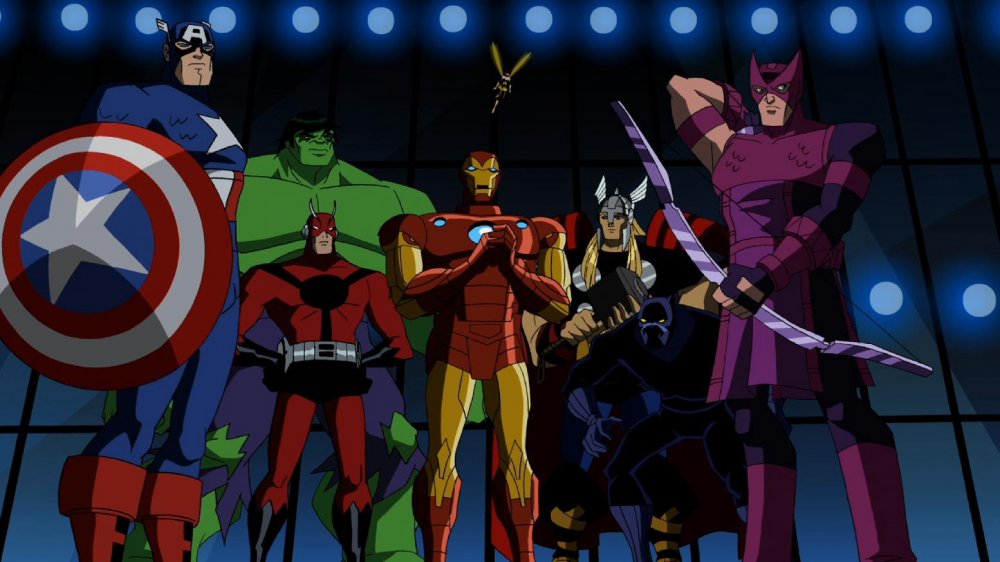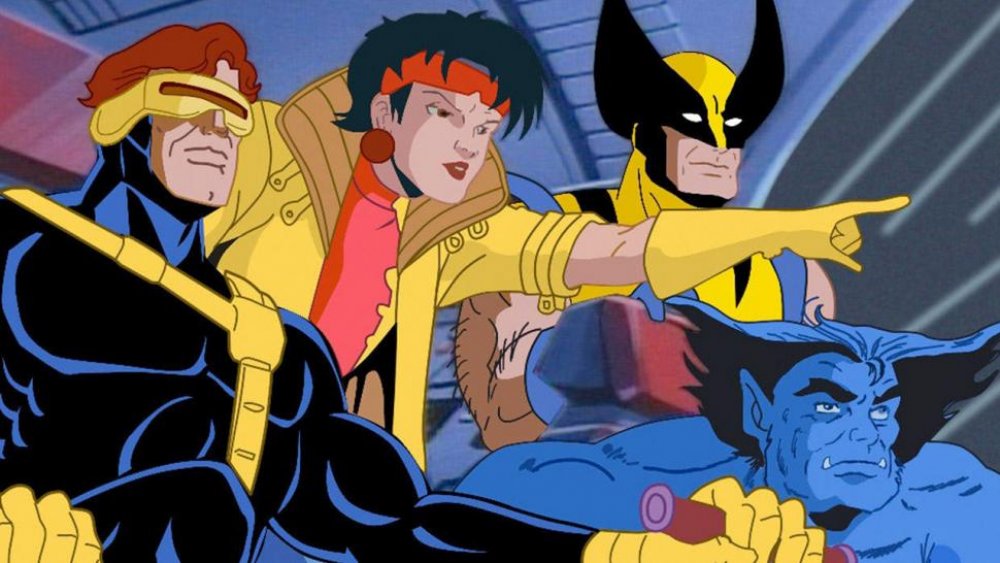The Real Reason These Animated Superhero Shows Were Canceled
Superheroes might rule the cinema, but they've long dominated the small screen, as well. The history of superhero cartoons contains, in fact, some of the genre's best work in any medium. Batman: The Animated Series was a sumptuous exploration of the Dark Knight's world, widely considered to be one of the greatest cartoons ever made. And 1967's Spider-Man gave the character an unforgettable theme song (and an avalanche of memes). The Tick delighted fans of all ages, and the show anticipated absurdist superhero successes like Deadpool by decades. You don't have to be a kid to enjoy these shows. You just have to have taste.
But nothing lasts forever. Some superhero cartoons have multiple seasons to tell their story, while others end abruptly, often on cliffhangers, left eternally unresolved. To make matters worse, explanations aren't always offered, leaving fans to speculate, crowdfund, and protest. But fortunately, for a handful of your favorite shows, we do indeed have some answers as to why they went away. Here are the real reasons these animated superhero shows were canceled, although in many cases, knowing why won't make their absence any easier.
Static Shock was a superhero show canceled because of merchandising
Virgil Hawkins is that most classic of superheroes — a normal kid until he suddenly very much isn't. Transformed by exposure to a mutagen gas, he gains the ability to control electromagnetism and becomes Static, hero of Dakota City. And alongside his best friend, Richie, he spent four seasons of Static Shock battling bad guys, learning life lessons, and occasionally hanging out with Shaquille O'Neal. Fans flocked to it. Static Shock earned high ratings from the very beginning, to the point of surpassing all other kids' shows save global juggernaut Pokemon. Nor did these ratings slacken with time. Reruns aired on Cartoon Network outstripped all other children's programming. What, then, put a halt to Static's crackling popularity? Well, it was something that had nothing to do with ratings: merchandising.
As creator Dwayne McDuffie recounted years after the show's end, animation is enormously expensive to produce, and it depends upon the success of multiple revenue streams. A well-rated cartoon must also have profitable toys, T-shirts, video games, and tie-in books, which Static Shock lacked. Sadly, toy companies weren't as keen on the cartoon as kids were. "After five years," McDuffie explained to The World's Finest, "we had a Subway value meal, two Scholastic book adaptations, one DVD, and a Gameboy Advance game." Being able to do as many episodes as they did was "a gift" — one that fans the world over were ecstatic to receive.
Teen Titans might've been canceled for a lot of reasons
Teen Titans slick style, unforgettable theme song, and clever twists on superheroic tropes dazzled fans right off the bat. Created to appeal to younger viewers, it was goofy (though nowhere near the levels of its successor, Teen Titans Go!), approachable to comics newbies, and with its anime-inspired aesthetic, it was unlike any other superhero cartoon then on the air. Though the series' final episode aired in January 2006, fan campaigns to resurrect Teen Titans continue to thrive online. Their passion is real ... yet so is the series' demise.
What stopped Robin and his merry band of adolescent avengers? A variety of explanations have been offered over the years. Wil Wheaton, voice of Aqualad, asserts that Warner Brothers executives were unimpressed by the sixth season's pitch. Story editor Rob Hoegee, however, has gone on record as saying that it was a decision made by Cartoon Network instead of Warner Brothers, and that the crew knew that the fifth season would be the show's last. And producer and writer David Slack has suggested two additional reasons as to why the show ended. First, it might've been because ratings dropped after Teen Titans' dark fourth season, and/or it might've been thanks to a dispute over toy licensing. As Bandai had the show's toy deal and Cartoon Network switched entirely to working with Mattel in 2006, that theory, at least, has some degree of evidence behind it. No one reason for the Titans' demise may ever emerge, yet their end remains resolutely in place, much to the frustration of long-time fans.
Spider-Man: The New Animated Series wasn't exactly a hit
"MTV Spider-Man," as it's sometimes known, was an odd creature from the very beginning. Animated by computer, it used cel-shading to ambiguous effect. Spider-Man: The New Animated Series was alluringly sleek but also oddly flat, especially to modern eyes. Its continuity was another hurdle. The show took place a year or two after 2002's Spider-Man film, but it had nothing to do with the world of 2004's massively popular Spider-Man 2. Its Peter, Harry, and Mary Jane were Empire State University students, facing villains that never made it to the silver screen like Kraven the Hunter. Add in the fact that it was initially intended to be an adaptation of the Ultimate Spider-Man comics, and the whole production makes a lot more sense ... but not to any kid trying to make sense of its tangled continuity back in 2003.
Spider-Man only managed one season before it was cancelled. MTV found the series' ratings lackluster, and so the plug was pulled. Director Brandon Vietti has since revealed plans for the scrapped second season, including storylines involving Mysterio and a thwarted desire to bring in the Vulture. Alas, it was not to be, but at least fans have gotten to see big-screen adaptations of both classic Spider-Man villains in the years since the series went off the air.
Beware the Batman was a financial failure
Released in 2013, Beware the Batman is unique within the Caped Crusader's animated history. Rendered in sleek CGI, Beware's Batman fights alongside a significantly more spry Alfred and Katana — here imagined to be Alfred's goddaughter — against lesser-known Bat-baddies like Anarky, Professor Pyg, Magpie, and Phosphorus Rex. A shake-up to be sure, but one built on a solid foundation. As series producers Glen Murakami and Mitch Watson explained, Beware the Batman was meant to be a return to the character's roots as a detective. It had potential, talent, and vision, and yet it was pulled from Cartoon Network's schedule a mere three months after its premiere.
An official explanation wasn't offered, and the series was moved to Adult Swim's Toonami block. There it stayed, until the only thing resembling an announcement was made by Toonami's official Tumblr blog: "Bad news: We JUST (like, hours ago) found out from our legal department that Beware the Batman ... [is] being 'written off,' financially, as of now." Toonami aired the final seven episodes of the series on September 28, 2013, and that was that. Other than that brief mention of financial failure, no further explanation has arrived, reruns are rare, and Batman fans must get their animated fix via Justice League Action and DC's (admittedly impressive) slate of direct-to-video films. Beware the Batman is well on its way to becoming much like its titular hero: a half-remembered phantom, shrouded in mystery, hearsay, and rumor.
Young Justice came back to life thanks to the fans
Young Justice delighted fans the world over when, three years after its 2013 cancellation, it returned for a third season, Young Justice: Outsiders. But why was it cancelled in the first place?
One explanation came from Kevin Smith's Fat Man on Batman podcast. In conversation with animation legend Paul Dini, the two men claimed that network executives were unsatisfied with Young Justice's high female viewership, as "they don't buy toys." Series developer Greg Weisman denied this, however. Three years after the show's untimely end, he identified Young Justices' weak toy sales, unrelated to gender, as the cancellation culprit.
Crowdfunding efforts sprung up in the wake of the show's cancellation, but Warner Brothers made it unequivocally clear that they weren't interested in furthering Young Justice in that way. Yet somehow, things changed. Young Justice's arrival on Netflix stirred up enough attention that rumors began to circulate about a possible continuation — rumors that Weisman eventually legitimized. He urged fans to keep making noise, and eventually, it was enough, and Young Justice returned to its eager fanbase. For some fans, dreams do come true ... if your Netflix debut produces big enough numbers, anyway.
Spider-Man Unlimited was defeated by Pokemon
Remember the 1990s Spider-Man cartoon? No, not 1994's Spider-Man: The Animated Series — we're talking about Spider-Man Unlimited. Not ringing a bell? That makes sense. Consisting of just 13 episodes, it was canceled before it managed to air even half of its modest run. It wasn't miserable to look at, nor were its ratings poor. What slew this spider?
A few different things, as it turns out. To begin with, the premise was strange. This cartoon follows a Peter Parker stranded on "Counter-Earth," where he fights alongside J. Jonah Jameson's son against the forces of the High Evolutionary. Marvel wasn't pleased with this complex plotting, but in fairness, the cartoon was looking far afield of traditional Spider-Man stories because it had to. Spider-Man Unlimited was made by Saban Entertainment, who had, in the wake of Sony and Marvel's deal to produce Sam Raimi's Spider-Man film, been cut off from using Spider-Man's familiar iconography and story beats. The final blow, however, came from an entirely different direction. Fox Kids, then "dealing with the realities of Pokemon as a competitor," didn't have faith in Spider-Man Unlimited's ability to take on Pikachu. Thus ended what just might be the weirdest Spider-Man cartoon of them all, slain by Ash Ketchum, movie rights, and overworked plotting.
Silver Surfer: The Animated Series was a superhero show that quickly disappeared
The Silver Surfer cartoon was a blink-and-you'll-miss it affair, the sort of footnote even die-hard Marvel partisans might not know about. A blend of cel-shading, computer animation, and Jack Kirby's sensational style, Silver Surfer: The Animated Series has only 13 episodes to its name, but boy, does it throw everything it can into those five-ish hours of storytelling. Characters like Shalla-Bal, Beta Ray Bill, and Uatu the Watcher populate the show's cosmic confines, alongside figures two decades' shy of superstardom, like Thanos and Gamora. It's big, bold science fiction that seeks to dazzles its viewers, no matter the age, with visions of planetary destruction and galactic altruism.
Its end came swiftly, however, and the series languished in obscurity for years. Many fans have speculated that the financial ruin then being faced by Marvel had something to do with the cartoon's cancellation, as the series debuted one year after the company filed for bankruptcy. Series creator Larry Brody has gone on the record as saying Silver Surfer fell apart because of a legal dispute between Marvel and Saban Entertainment, with scant few details offered beyond that. Happily, the series is now available on Disney+, which is a dramatic change for fans of the series, as it was only previously available on bootleg DVDs.
Marvel pulled the plug on Wolverine and the X-Men
A sleek take on the X-canon, Wolverine and the X-Men is chock-full of the action, angst, and adventure that fans of Marvel's mutants love. And it took full advantage of the decades of storytelling it had at its disposal. Characters like Dr. Kavita Rao, the Stepford Cuckoos, and Marrow made their television debuts as part of the show, while runs like Joss Whedon and John Cassaday's Astonishing X-Men served as the basis for the plot.
Though a second season was in production (to the point that images from it were presented at 2009's San Diego Comic-Con), it was abruptly scrapped, leaving fans in the lurch. Corporate shifts had taken place over the course of the series' run, chief among them Disney's purchase of Marvel. Fox then held the movie rights to the X-Men, and as fans would come to know, Marvel was building towards cinematic dominance. Teams and characters that couldn't contribute to that effort were automatically of lower priority, and thus ended Wolverine's time as the cartoon captain of the X-Men. The saddest part? Head writer Greg Johnson has since revealed that Deadpool was going to be introduced in the cartoon's second season.
Green Lantern: The Animated Series was the victim of a box office bomb
The DC Animated Universe had gone to outer space before Green Lantern: The Animated Series debuted, but never quite to the same degree. After all, Green Lantern's scope is enormous. The protagonist of the series, Hal Jordan, is the first human to ever wear the Green Lantern power ring. He and his friend, Kilowog, a veteran Lantern, venture into "Frontier Space" together in the very first episode, a choice that set the tone for the rest of the series. Fans adored the show's wide-open vantage point, CG aesthetic, and original characters — especially Razer, a Red Lantern out for redemption who finds himself falling in love with Aya, an advanced AI.
Despite its passionate fanbase, however, Green Lantern: The Animated Series was cancelled after just one season. Hal Jordan's voice actor, Josh Keaton, spoke to IGN in the wake of the announcement, acknowledging fans' anger and the unfortunate cliffhanger the series now ended on. The reason behind the cancellation? From what he'd heard, the so-so performance of the Green Lantern movie meant that a glut of movie toys ended up confused for animated series toys, which translated to stores stocking less of the latter, depriving the series of funding. Ryan Reynolds might've managed to bounce back from Green Lantern's sorry reception, but Green Lantern: The Animated Series will remain a casualty of its failure forever.
The Avengers: Earth's Mightiest Heroes was an epic superhero show canceled thanks to the MCU
The Earth's Mightiest Heroes might've premiered in 2010, but its heart was classic Marvel. Though characters like Captain America, Black Panther, and Ms. Marvel would eventually join the team, its debut line-up is the same as the one from 1963's The Avengers #1: Iron Man, Ant-Man, Hulk, Thor, and the Wasp. That doesn't mean it confines itself to one era of Marvel storytelling, though. Earth's Mightiest Heroes became a beloved series precisely because it adapted everything from 2000s comics arcs like "Secret Invasion" to 1983's beloved "The Ballad of Beta Ray Bill." New characters existed seamlessly beside old ones, while vintage plots were elegantly recalibrated for younger viewers. It was, in short, a whole heck of a lot of fun.
So when it wasn't renewed for a third season, fans were upset. Earth's Mightiest Heroes was scrapped to clear the way for a new cartoon, Avengers Assemble, a change Jeph Loeb, head of Marvel Television, compared to a change of writer on a comic series. Avengers Assemble is technically about the same characters, but it's also a different cartoon entirely, far more in line with the MCU. Though it's fun on its own merits, it's not Earth's Mightiest Heroes — a fact its fans have had to get used to.
X-Men: The Animated Series was never technically canceled
If all X-Men: The Animated Series ever contributed to the X-Men canon was its killer theme song, that would've been enough. But it went above and beyond that sick riff by adapting many of the X-Men's best stories, from "Days of Future Past" to the infamous "Dark Phoenix Saga." A better introduction to these characters and their world can scarcely be imagined, and kids responded in kind, watching the show in droves.
X-Men: The Animated Series packed five seasons full to bursting with time travel, cosmic adventure, and societal turmoil. And honestly, its end should've arrived much earlier than it did, as it'd been plagued with delays and production errors for years, and the show's run coincided with an era of financial ruin for Marvel that culminated in their bankruptcy. But the cartoon's success was undeniable. Despite the fact that the initial series order had been for 65 episodes, production company Saban Entertainment decided to extend the series to 76 episodes. In that sense, the series is a true rarity: It was never really cancelled at all.
